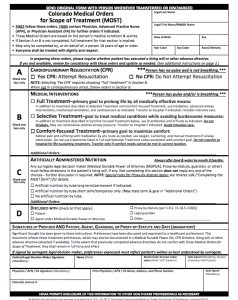If you want to avoid extensive hospital treatment or heroic measures being used on you towards the end of your life, it’s much harder than you think. It’s far more difficult than you’d ever realized these days to die a peaceful, natural death in your own home, if that’s the way you want your life to end.
These days many people don’t relish the idea of having their death drawn out in a hospital, hooked up to life support machines. If you are one of those people, you can complete an advanced directive and a will, put all your assets in a trust, and even verbally tell your closest family members that you don’t want any more hospitalizations. But that’s not enough.
Chances are very high that unless you do ONE more thing, you’ll still end up in a hospital getting a host of unwanted procedures or mechanical life support at the end of your life.
If near the end of your life you do not want to go to the hospital under any circumstances, and you want to let a natural process take your life, your family members or caregivers risk charges of medical neglect or abuse if they abide by your wishes. This is the case even if you have put all the above due-diligence documents in place. It’s extremely hard for relatives who love you to watch you get weaker and sicker and not do anything to help you. Caregivers fear lawsuits for neglect not giving every last possible measure of care in what they perceive as a desperate time of need. Some paid caregivers may be a different religion that you, and believe it is impermissible for you to determine the time and place of your own death.
These and many other conflicts can abound at the end of your life.
To protect close relatives and caregivers looking after you from a legal onslaught and assure you get the kind of care you really want at the end of your life, there is one more thing you must do: fill out a M.O.S.T. form.
What is a MOST form?
M.O.S.T. stands for Medical Orders for Scope of Treatment. Most people have never heard of this form, but it in recent years it has become the key to self-determination at the end of your life.
The MOST form is relatively new. Colorado implemented its MOST form only about five years ago, and recently revised it. Every U.S. state now has its own version of a MOST form. In some states they are called a Physicians Order for Life Sustaining Treatment or a POLST form.
The MOST form is a very specific medico-legal instrument that summarizes and documents your personal preferences for a number of common life-sustaining treatments, including things like CPR, antibiotics, artificial nutrition and hydration, and mechanical ventilation. You can choose the extent to which you want these treatments to be used to save or prolong your life, under what circumstances and for how long. The form is usually printed on bright green paper, for quick location and recognition in medical files.
MOST forms assure you the ability to exert more control over your medical care
Individuals may use the MOST form to refuse treatments selectively, request full treatment under certain circumstances, or specify certain treatments they do not want. Any section of the form that is not completed implies full treatment is desired. Filling out a MOST form assures that not only will you get the specific care you want at the end of your life, but it will protect those who are responsible for making medical decisions on your behalf from legal charges of abuse or neglect if they abide by your wishes. Such charges can be brought by relatives who don’t agree with the kind of death you want for yourself, or by law enforcement.
The MOST form is used in conjunction with other legal instruments, like advanced directives and living wills. You must complete the MOST form while you still have your mental capacity. You and your doctor both sign the completed form. Everyone who could even be tangentially involved in your care towards the end of your life should get a copy of your completed MOST form. Make sure to give a copy to whomever has your medical power of attorney, too. Give copies to all of your children, even ones who live elsewhere and visit rarely, and even the crazy ones. Give them to your close friends, too.
The MOST form must be honored in any setting, including at home.
This relatively new form is the key to being able to have the kind of death you want, especially if your choice involves refusing invasive, life-sustaining treatments.
You can view Colorado’s MOST form here (pdf).
For more information on the MOST form, to see one, download a free copy or get answers to frequently asked questions about the form, go to the Colorado Advanced Directives Consortium, or talk to your doctor or your attorney.

